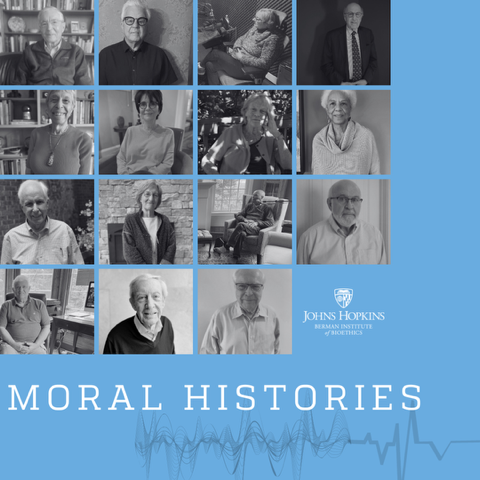Moral Histories
The Berman Institute is proud to announce the expansion of the Moral Histories project—a collection of oral history interviews with the founding generation of bioethics scholars.
The first phase comprised 96 hours of audio recorded oral histories with 15 scholars from the founding generation of the field of bioethics. In 2025, we added the oral histories of 18 additional scholars, which were conducted in collaboration with oral historian Amy Sullivan, PhD.
And in the coming months, with funding from the Wellcome Trust, we will expand the scope of the collection to interview bioethics scholars outside of the United States. To help identify English-speaking scholars whose work contributed to the development of the field across the globe, please submit your recommendations for interviewees here.
The collection includes interviews with:
Moral Histories
Hear voices from the founding generation of the field of bioethics

Subscribe to our weekly Bioethics Bulletin e-newsletter or follow the Berman Institute on Twitter or Facebook for project updates.
About the Collection
The field of Bioethics in the United States was born in the crucible of social upheaval and scandal of the 1970s. In the shadow of the civil rights movement, the recognition of patients’ rights to self-determination, and the disclosure of scandals like the Tuskegee Syphilis Study, a group of idealistic young philosophers and theologians began to work with physicians, nurses, lawyers, and others to begin to sort out the moral complexities of advancing medicine.
This founding generation created a new field that would eventually come to be called bioethics, and their work has had far reaching impact and influence on the lives of people around the world—in shaping laws and influencing legal decisions, in shaping government policies, and in crafting approaches to decision making that continue to be used in managing complex medical cases, from definitions of death to allocation of lifesaving resources to responses to public health emergencies. This is an essential history to capture.
The Berman Institute is undertaking an oral history project to interview members of the founding generation of American bioethics. The resulting collection, titled Moral Histories, will serve as a unique and accessible resource for understanding the creation and formation of the field. It will become part of a group of projects designed to inform and engage the multiple publics interested in bioethics, including scholars, policy makers, health care professionals, researchers, students, and of course the public at large.